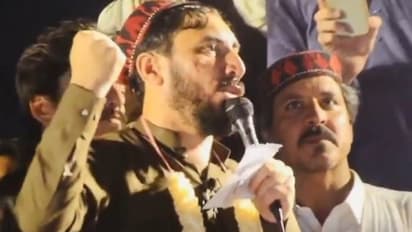'Bengalis took Pak Army's pants off, we will rip skin off': Pashtun leader's fiery speech goes viral (WATCH)

Synopsis
Manzoor Pashteen, the founder and head of the Pashtun Tahafuz Movement (PTM), made headlines by delivering a scathing criticism of Pakistan's military establishment.
In a fiery and impassioned address that has taken social media by storm, Manzoor Pashteen, the founder and head of the Pashtun Tahafuz Movement (PTM), made headlines by delivering a scathing criticism of Pakistan's military establishment. Pashteen's speech was laced with historical references and stern warnings, underscoring the mounting tensions between the Pashtun population and the Pakistani military.
In one of the most striking moments of his address, Pashteen invoked the Bangladesh Liberation War of 1971, stating, "Bengalis took Pakistan Army’s pants off, we will rip their their skin off." The blunt language not only reflected the deep-seated anger and frustration of the Pashtun people but also served as a bold reminder of Pakistan's past failures in suppressing ethnic dissent.
Addressing Pakistan’s military leadership directly, Pashteen named several high-ranking officials, including the Chief of Army Staff, the Director-General of the Inter-Services Intelligence (ISI), and Corps Commanders stationed in Balochistan and Khyber Pakhtunkhwa. His message was clear: the Pashtun people no longer wished to remain under the control of what he described as a repressive regime.
"Pakistan’s chief of Army staff, listen... DG ISI, listen... Corps Commander, listen... those in Balochistan or Khyber-Pakhtunkhwa, listen... Pashtoons don’t want to stay with you. This cannot continue," he declared with fierce determination, suggesting that the oppression faced by the Pashtun people could soon lead to an escalation of resistance.
He went on to warn the military not to force the Pashtuns into action, implying that the consequences would be dire. "Don’t force us to come to Islamabad. We are being forced, don’t force us to take action. It won’t be in your favor. It will cause a great deal of damage to you."
Pashteen also paid homage to the sacrifices of those who have stood up for the Pashtun cause, criticizing the state for its violent repression of dissidents. "They kill those who stand up for Pashtoons," he stated, emphasizing the PTM’s resolve. "We are willing to sacrifice our lives and head for our nation."
In his pointed criticism of the Pakistani state, Pashteen did not hold back, accusing the authorities of manipulating religion for political gain. "Pakistan doesn’t believe in Islam; they only believe in creating ruckus. See what Pashtoons do to such scoundrels," he remarked, rallying the Pashtun people to stand against what he characterized as the hypocrisy of the state.
Pashteen’s reference to the Bangladesh Liberation War was a particularly poignant aspect of his speech. By recalling the humiliation of the Pakistani military in 1971, when Bangladesh (then East Pakistan) successfully broke away to form an independent nation, he drew a direct parallel between the struggle of the Bengalis and the current plight of the Pashtun people.
"Bengalis took Pakistan Army’s pants off," he said, alluding to the Pakistani Army’s surrender to Indian forces during the war. His statement carried a sharp message: just as the Pakistani military was unable to suppress the Bengali independence movement, it would also fail in its attempts to silence the Pashtuns. "We would rip their skin off," Pashteen vowed, signaling that the Pashtuns would not back down in the face of oppression.
Pashteen’s speech comes just days after the Pakistani government, in a controversial and draconian move, announced a ban on the Pashtun Tahafuz Movement, branding it a threat to national security. The ban, issued under Section 11B of the Anti-Terrorism Act of 1997, claimed that the PTM was engaged in activities "prejudicial to peace and security of the country."
Pakistan has also added the names of 52 individuals from various districts of Khyber-Pakhtunkhwa to the Fourth Schedule under Section 11EE of Pakistan's Anti-Terrorism Act, 1997. In the Fourth Schedule list 16 individuals have been added from South Waziristan, including PTM founder Manzoor Pashteen.
The PTM, however, has consistently maintained that it is a peaceful movement advocating for the rights of the Pashtun people, demanding an end to enforced disappearances, extrajudicial killings, and the restoration of civil liberties in the war-torn Pashtun regions.
The ban has been widely condemned as yet another example of the Pakistani state's authoritarian tendencies, with critics accusing the military-dominated government of using oppressive laws to stifle dissent and silence opposition.
Check the Breaking News Today and Latest News from across India and around the world. Stay updated with the latest World News and global developments from politics to economy and current affairs. Get in-depth coverage of China News, Europe News, Pakistan News, and South Asia News, along with top headlines from the UK and US. Follow expert analysis, international trends, and breaking updates from around the globe. Download the Asianet News Official App from the Android Play Store and iPhone App Store for accurate and timely news updates anytime, anywhere.